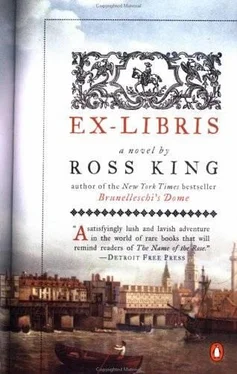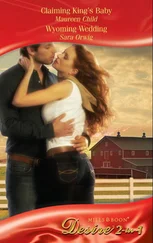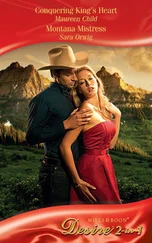She paused to withdraw from the folds of her skirts an object that in the poor light I took a moment to recognise as a tobacco-pipe, which she then proceeded to fill, expertly, with tobacco. I expected her to hand it to me but was surprised to see her fit it with equal expertise between her molars. Her face flashed orange as she lit a taper and coaxed the bowl to life.
'Forgive me,' she said, gusting smoke and waving the taper through the air to extinguish its flame. 'Virginia tobacco. The fire-cured leaf of the Nicotiana trigonophylla , a particularly delicious species. Sir Walter Raleigh claims harmful effects for it, but I have always found a postprandial bowl an excellent aid to digestion, especially if smoked in a clay pipe. My father once owned a calumet,' she continued as a cloud of smoke unfurled into the space between us. 'It had a clay bowl and a stem made from a reed plucked from the shore of Chesapeake Bay. It was made a present to him by a Nanticoke chieftain in Virginia.'
'Virginia?' Sir Ambrose Plessington, that Proteus, that decagon with all of his mysterious side-facets, assumed yet another guise. But I was here on other business. 'You were mentioning that Monboddo-'
'Yes, yes, we were speaking of Monboddo, not of my father. Nor of Raleigh.' She had leaned back and was reclining on the bed now, on its half-dozen scattered cushions, her great tangled mane against the headboard. 'Yes, there were stories, I should almost say legends, about Henry Monboddo.'
'Legends of what sort?'
'Well… where shall we begin?' She cupped the bowl in her palm and for a few seconds studied the canopy above her head as if for inspiration. 'For one thing,' she resumed, 'it was said that he negotiated the purchase of the Mantua Collection in the year 1627. In those days he was the artistic agent for King Charles. That much was common knowledge. He was also the agent for the Duke of Buckingham. The first Duke, I mean-Sir George Villiers, the Lord High Admiral. Monboddo scoured the courts and studios of Europe on behalf of the pair of them, bringing back to England all sorts of items. Books, paintings, statues… whatever might have struck the fancy of those two great connoisseurs.' The clay pipe wavered and glowed before me as she took another slow draught of smoke. 'You have heard of the Mantua Collection?'
I nodded. 'Of course.' Who had not? Dozens of paintings by Titian, Raphael, Correggio, Caravaggio, Rubens, Giulio Romano, all purchased by King Charles for the sum of £15,000-a bargain even at that price. The canvases hung in the galleries of Whitehall Palace until Cromwell and his band of philistines sold them off to pay their debts. It was the greatest disgrace, in my opinion, of Cromwell's reign-a despoliation of our entire nation.
'The silk industry in Mantua had collapsed in the 1620s,' she continued, 'and so the Gonzagas were starved for funds. King Charles was also starved for funds, but a detail such as that hardly troubled him where paintings were concerned, especially ones as marvellous and valuable as those in the Mantua Collection. He could scarcely believe his ears when he first heard the report from Mantua. A special tax was levied and Monboddo raised the remainder of the funds along with Sir Philip Burlamaqui, the King's financier. At the same time, of course, Burlamaqui was raising funds to equip a fleet of a hundred ships for Buckingham's expedition to the Île de Ré, where the Protestants of La Rochelle were besieged by the armies of Cardinal Richelieu. An unfortunate coincidence of events,' she murmured. 'The King was forced to choose between his ships and his paintings.'
But he chose the paintings. I knew the story well. He chose the paintings over the lives of his mariners and the Huguenots, beggaring the fleet in order to pay the Mantuans. Five thousand English sailors in their rotting ships starved to death or were slaughtered by French troops, and who knows how many Huguenots died at La Rochelle. The expedition was a disaster, even worse than Buckingham's raid on Cádiz two years earlier. So the paintings from the Mantua Collection-all of those images of the Virgin Mary and the Holy Family-were steeped in Protestant blood, paid for by the lives of Englishmen and the Rochellois.
'This most wonderful collection became the shame of Protestant Europe,' she said, 'as did the treasures assembled by Buckingham at York House. For Buckingham had not only led the failed expedition, he had also arranged King Charles's marriage to the sister of Louis XIII and then loaned to the French navy the ships with which Richelieu proceeded to batter La Rochelle and later the half-starved English fleet. And so is it any wonder that Cromwell should have wished to sell both collections, York House as well as Whitehall Palace?' She paused to draw thoughtfully on the pipe. 'And that, Mr. Inchbold, is where the other rumours begin.'
I was frowning in the darkness, trying to catch the twisted thread, to assemble in my head the cast of characters: Buckingham, Monboddo, King Charles, Richelieu. 'Are you saying that Monboddo was involved in the sale of the Mantua Collection as well as the paintings from York House?'
'So I believe.'
'He was in league with Cromwell, then?'
'No, he was in league with someone else. The rumours claimed that Monboddo was secretly acting as the agent for Cardinal Mazarin, the Chief Minister of France, Richelieu's protégé. It was well known that Mazarin hoped to lay his hands on the treasures that Cromwell was selling. Monboddo covered his tracks very well, of course, as did Mazarin, but my husband came to believe the rumours. For that reason he dismissed Monboddo as his agent and refused to part with a single volume even though in those years we were as poor as tinkers.'
'But why should Lord Marchamont have been so opposed to the sale? The collection would have been lost to England, it's true. It would have been a great pity. But we were no longer at war with the French. In those days they were supposed to be our allies in Cromwell's war against Spain.'
'Yes, but there were principles involved. Other concerns.'
She hesitated as if uncertain whether to continue. But at length, as another cloud of smoke twisted between us, she explained how any such transaction would have violated the letter of her father's will, which stipulated that the collection should be neither broken up nor sold, either whole or in part, to anyone of the Roman faith. Rome with its Index librorum prohibitorum was the enemy of all true knowledge. Sir Ambrose believed that Rome stood not for the dissemination of thought but, rather, its suppression. The works of both Copernicus and Galileo had been proscribed, as had the Cabala and other magical Jewish writings studied by writers like Marsilio Ficino. In 1558 the penalty of death was decreed against anyone who printed or sold condemned books. Hundreds of booksellers fled Rome after the publication of the Index in 1564, followed by thousands of Jews expelled by Pius V, who suspected them of abetting Protestantism. The Hermeticists soon found themselves under the same cloud as the Jews. The editor and translator of the polyglot edition of the Corpus hermeticum was condemned by the Inquisition as a heretic, while the greatest Hermeticist of all, Giordano Bruno, was burned at the stake. His crime had been championing the doctrines of Copernicus.
'Oh, I know all of this must sound peculiar to you, Mr. Inchbold, like the ravings of a zealot. But my father was most determined on these points. He believed in the Reformation and the spread of knowledge, in a worldwide community of scholars, a Utopia of learning like the one described by Francis Bacon in The New Atlantis . So it would have been a disaster, in his opinion, for a single book to fall into the hands of someone such as Cardinal Mazarin, a pupil of the Jesuits.' She paused again, then dropped her voice as if fearful of being overheard. 'You see, my father had rescued the books from the bonfires of the Jesuits once already.'
Читать дальше












